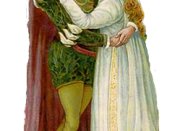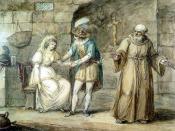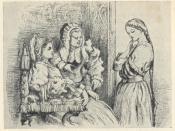Whilst time and place usually do change our values, the human condition remains essentially the same. Such a testimony can be seen in the play 'Romeo and Juliet' by William Shakespeare as the values of fate, love and hate, and excess and moderation are being displayed.
Values are defined as the concept that describes the beliefs of an individual or culture, whereas the human condition encompasses the totality of the experience of being human and living human lives. Thus, it is clear that our values are indeed affected by time and place, whereas the human condition is universal as it describes the joy, terror and other feelings or emotions associated with being and existence.
The idea of fate is most prominent throughout 'Romeo and Juliet'. The play begins with a prologue, which states "A pair of star-cross'd lovers take their life" (prologue) clearly affirming that the fair tale of Romeo and Juliet is to end in death as they were destined by the stars to bad fortune.
The idea of fate permeates the play for the audience, as well as for the characters, as Romeo and Juliet constantly perceive omens foreshadowing their tragic end. Upon entering the party held in Capulet's mansion, Romeo foretells his grim future, "With this night's revels, and expire the term/ Of a despised life closed in my breast/ By some vile forfeit of untimely death." (Act 1, Scene 4) as he claims that by entering the mansion, he is allowing fate to take control of his life and cause his premature death. Later in the play, Romeo cries that he is "fortune's fool" (Act 3 Scene 1), Juliet exclaims that she has an "ill-divining soul" (Act 3, Scene 5) and Romeo's predictions even extend into his dreams as he says "I...


